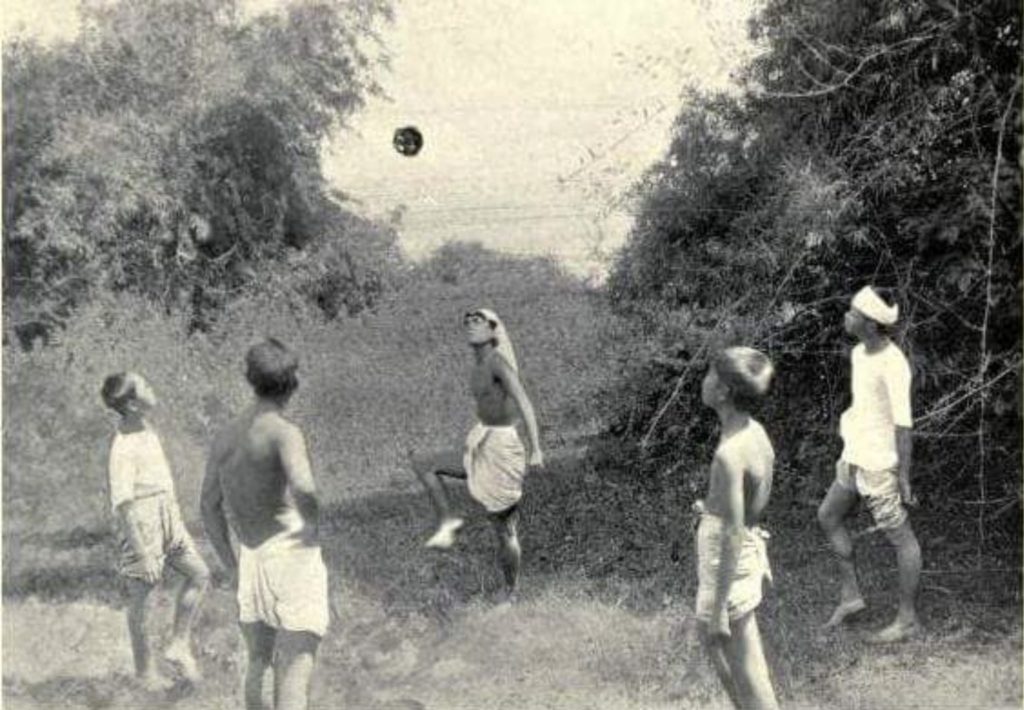PHILOSOPHY
The traditional game ‚Chinlone‘ is the No. 1 national sport in Myanmar.
The name derives from the hand-woven rattan ball, that this game is played with. The sport is at least 1500 to 1800 years old, and has a unique, incredibly sophisticated body technique that has produced very virtuoso players and teachers.
The special thing about this game: it’s non-competitive! It is based on cooperation and not on the single player. Therefore, you find no opponents, no losers and no competition in Chinlone. The most entertaining and beneficial game results from a combination of maximum cooperation, as well as the most spectacular moves possible.
The ball is passed dynamically between six players, while they continuously move in a circle of about 5 meters in diameter, always keeping the ball in the air.

Meditation in sports
There are various ecstatic techniques (see Mircea Eliade 1986) or meditative approaches that a person can practice for her or his well-being. In our opinion, they are all focused on the same goal: wholesomeness through the transformation of quotidian consciousness: a kind of psycho-hygiene. On the side of deprivation techniques are e.g.: sitting meditation, sweat lodge and fasting. On the side of overstimulation of the senses are e.g.: Sufi rituals, dance, chanting, drums and holotropic Breathing. Chinlone is definitely located at the second of the two extremes of the spectrum: a kind of overstimulation, or “velocity–meditation” (as we call it), which induces trance-like states. The reason why Chinlone, although it is a sport, is one in this list of ecstatic techniques, is because of its non-competitive, peaceful gameplay. It’s all about helping the other players keep the ball in the air. Thus, in a prolonged and regular training, this mental state can be observed in the game, which has trance-like qualities, and represents a refreshing counter–movement to everyday stress. We observed this effect taking place during several hours of playing Chinlone, which puts the mind in an altered state of concentration. Women like men, young and old, rich and poor are welcome in this game. Gender, cultural heritage, age and even religion or language are irrelevant: anyone can start playing immediately.
Just a game?
This sport is very conducive to humans for several reasons: It has enormous potential to bring the people of this world closer together. Linguistic or cultural differences can be bridged playfully through the obvious and simple principle of this game. As you explore Chinlone’s deep, philosophical implications over a longer period of time, say a year or two, their relevance for your everyday life, and a peaceful togetherness of all people on this planet become clearer. Thus, peaceful, cooperative approaches and insights from the game’s dynamics will also be integrated into everyday life of the players. Chinlone teaches us a valuable lessons concerning: physical well–being, mental health, friendship, the coming together of cultures through team sports. All of that, but still above all: Having lots of fun while playing.
We came across Chinlone thanks to the autobiographical documentary called Mystic Ball starring Greg Hamilton, which premiered in Canada back in 2006: https://www.mysticball-themovie.com/index.html. Go check it out! The War Tha Nar Lulin Team (Mandalay Region Chinlone Team of U Maung Maung) is featured as well as an in-depth cultural assessment of Chinlone.
Chinlone Europe
This association extends at present from France (Annecy) over Germany (Frankfurt) to Austria (Vienna). This association ensures the dissemination of Chinlone at a European and international level. To ensure that Chinlone spreads further according to the ideas of the players and teachers living in Myanmar, we keep them updated about our activities here in Europe, so they can actively influence this process. In the future, our friends from Burma will be brought to Europe to teach this sport authentically. If the peaceful philosophy of Chinlone is passed on in its traditional form, it can have a very beneficial impact on the future development of the European project.
Mingalabar!
Author: Mag. Manuel Wagner
